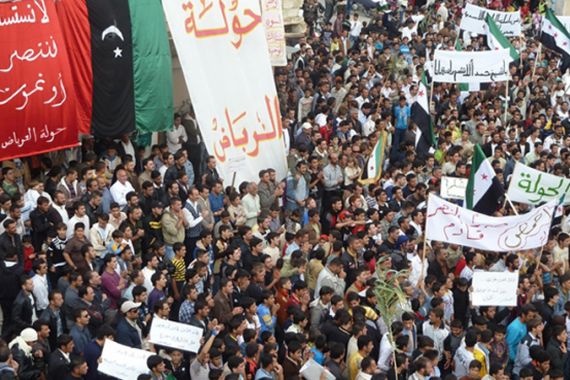Arab League hands Syria plan to end unrest
Plan involves talks between authorities and the opposition to end the uprising against President Assad’s rule.

The Arab League has handed Syrian officials a plan for ending seven months of increasingly violent unrest against President Bashar al-Assad’s rule.
The Arab League committee gave its plan, involving talks in Cairo between the Syrian authorities and their opponents, to Syrian Foreign Minister Walid al-Muallem and Bouthaina Shaaban, a political adviser to Assad, on Sunday in Qatar.
The League had previously set a two-week deadline for the start of such talks, which expired on Sunday.
The committee said it hoped for a Syrian response to its plan by Monday but the Syrian delegation left Doha without submitting any official comment.
“More important than a dialogue is action … This committee has given a very strong response to the recent killings,” Qatari Prime Minister Hamad Bin Jassim Al Thani, whose country presides over the committee, told reporters in Doha.
Syrian objections to holding a meeting outside Syria regarding what they consider domestic affairs was one of the points of disagreement between the two sides.
The plan was believed to include immediate release of political prisoners, withdrawal of security forces and presence of Arab League monitors inside the country.
“The crackdown has not stopped, despite efforts by the Arab League,” Al Jazeera’s Rula Amin said, reporting from the Syria-Lebanon border. “Very few people have faith that this Arab initiative will bring an end to the crisis.”
Assad told Russian television on Sunday that he would co-operate with the opposition even as he had earlier warned in another interview of an “earthquake” if the West intervened in his country.
In an interview with Britain’s Sunday Telegraph newspaper, Assad said international involvement risked transforming Syria into “another Afghanistan”.
He also stressed that Syria was key to keeping peace in the region.
“Do you want to see another Afghanistan, or tens of Afghanistans? Any problem in Syria will burn the whole region. If the plan is to divide Syria, that is to divide the whole region,” he said.
‘Not the stereotypical Arab dictator’
In an interview with Al Jazeera, Andrew Gilligan, the Telegraph journalist who met Assad, said the Syrian president seemed “reasonably relaxed, and quite personable” during their interview.
“He is not the stereotypical Arab dictator,” said Gilligan. “He is not blustering, or aggressive.”
Louay Safi, a member of the opposition Syrian National Council, said Assad has to understand that he is “inviting an intervention”.
“There’s only so much the world can bear in terms of force against unarmed civilians,” he told Al Jazeera. “If he continues on the same path, then he will be responsible for inviting an intervention.”
|
Andrew Gilligan talks to Al Jazeera about Assad |
Assad has drawn repeated condemnation from the United Nations, Arab League and Western governments for the violent manner in which he has attempted to crush the uprising.
As Arab ministers met in Qatar, Assad told Russian television that he was willing to talk to the opposition.
“We will co-operate with all political powers, both those who had existed before the crisis, and those who arose during it,” he said. “We believe interacting with these powers is extremely important.”
Also on Sunday, China’s Middle East envoy called on the Syrian government to speed up reforms it has promised in response to popular demands, saying the situation was dangerous and the bloodshed could not continue.
Speaking in Cairo after a visit to Syria, Wu Sike told reporters that Assad’s government must take “palpable steps” to end the violence.
“There must be respect and response to the aspirations … of the Syrian people.”
He said he had met Syria’s deputy president and foreign minister and members of the opposition movement while in the Syrian capital Damascus, and insisted that China was neutral in the conflict.
“I emphasised to top officials the danger of the situation in Syria and that the situation cannot continue,” he said.
In the latest reports of bloodshed, opposition sources said 61 civilians and 30 soldiers had been killed in clashes over the previous three days, many of them in the city of Homs.
The UN estimates that more than 3,000 people, including nearly 200 children, have been killed in the unrest. Since the start of protests in March, Syrian authorities have blamed the violence on gunmen they say have killed 1,100 soldiers and police.
Syria has barred most international media, making it hard to verify accounts from both activists and the authorities.